Ozaki powers to 4th career national title in return to 62kg
Friday, December 20, 2024 - 15:49 By Ken Marantz

Nonoka OZAKI works the lace lock during the women's 62kg final against high schooler Shirin TAKEMOTO. (Photo: Takeo YABUKI / JWF)
TOKYO (December 20) -- Having made an unintended move up to 68kg that still resulted in an Olympic medal, Nonoka OZAKI is back at 62kg. She can't say for sure that that's where she will be at the time of the next Olympics, but she's off to a good start in a bid to make that happen.
Ozaki, the only one of Japan's 11 medalists at the Paris Olympics entered in the Emperor's Cup All-Japan Championships, swept to the 62kg gold on Friday at Tokyo's Yoyogi No. 2 Gym for her fourth career national title.
The 21-year-old Ozaki, last year's 68kg champion, completed an unscored-upon run to the gold with a 10-0 technical fall over high schooler Shirin TAKEMOTO in the final to add to the 62kg titles she won in 2020 and 2021.
"I realize that to compete against the top wrestlers, I have to raise my level both technically and physically," Ozaki said. "It was a relief to come out with a win at this stage, but it also made me aware there are many things I need to work on."
In other highlights on the second day of the four-day tournament that is also serving as one of the two domestic qualifiers for next year's World Championships, three-time former world champion Haruna MURAYAMA needed a dramatic last-second victory at women's 55kg to win her first title in five years, and Katsuaki ENDO denied training room collegue's bid for a historic first by regaining the Greco 67kg title.
Ozaki was the world champion at 62kg in 2022 and seemingly on a fast track to Olympic glory when her plans were derailed by Sakura MOTOKI, who moved up from 59kg and snatched the Paris berth in the Olympic weight.
Ozaki famously made the daring decision to bump up all the way to 68kg, and it paid off when she scored a miraculous playoff victory over Ami ISHII at the buzzer for the ticket to Paris. There, she came away with a bronze medal -- below expectations, no doubt, but a solid performance nonetheless.

The Emperor's Cup marked Ozaki's first competition since Paris, after which she took about two months off and comtemplated which direction she wanted to go. While Japan's other Olympic medalists are still recovering while enjoying the fruits of their labor, Ozaki said she came to the decision in October that it was time to get back into action.
"I really struggled with this decision," she said. "I was coming off the break, so I had to become resolved to do it. If I was going to enter, I didn't want to lose. That was the main thing.
"There was pressure that by coming back and entering the tournament, I was expected to win, and that's tough. But I lived up to the challenge and was in good condition, so I'm glad I did it. I put the Olympics in the past. It was a great experience, but I saw this as a making a new start."
Starting with a victory by fall over world U20 bronze medalist Nagisa ITO, Ozaki faced her toughest challenge in the semifinals from Misuzu ENOMOTO, who had won a bronze medal at the Korean Open in September. Ozaki was never in trouble in carving out a 4-0 win.
The final was vintage Ozaki, as she scored a quick takedown against Takemoto and transitioned to a high-leg roll. From there, she moved down to a lace lock to make it 6-0, then added a takedown to go into the break up 8-0. She needed just 18 seconds of the second period to end the match with a quick shrug-by takedown.
"This tournament, I felt I was in the bracket with strong opponents leading up to the final," Ozaki said. "I thought the semifinal would be the mountain I had to get over. But anyone who makes it to the final will be tough, the key was to not let down my guard. This time it was a high schooler, and they have a lot of spunk and want to knock off those at the top. I remember back to when I was a high schooler. I fought hard with that in mind."
Ozaki makes no secret of her desire to get to and win the gold at the Los Angeles Olympics. She's just not sure in what weight class fate will put her.
"I'm not thinking yet that four years from now I'll be at 62kg, but my weight has come down from its peak and at this time it seemed that 62kg was the most suitable for me and that's what I entered here," she said.
"Looking at my next objectives, there is the Asian Championships next year, the [world] under-23 and qualifying for various tournaments. My goal is to be well prepared and come out with victories."

Murayama foils high schooler's upset bid
In women's wrestling in Japan, there always seems to be another new prospect coming on to the scene, and Murayama ran headlong into one of the latest rising stars, and only barely avoided a stunning upset.
Murayama, who had won her three world titles (2017, 2018 and 2023) under her maiden name of OKUNO, scored a 4-point takedown in the final seconds of the 55kg final for a 6-3 victory over 18-year-old world U20 champion Sowaka UCHIDA.
In a defensive battle, Murayama was leading 2-1 in the second period, with all of the points coming on the activity clock, when Uchida suddenly charged ahead and scored a stepout as Murayama defended with whizzer. A challenge was unsuccessful, putting Uchida up 3-2 with 11 seconds left.
Murayama was not to be denied and came out charging like a bull, managing to plow Uchida over backwards during the final ticks of the clock for the 4-pointer.
"If I could get one point, I would win, so I didn't need a takedown," Murayama said. "I pressed for one, but she's flexible and can keep from being forced out, so I thought I couldn't get her out. I felt her power making a stand, so I changed direction and got the points."
Uchida, a member of the JOC Academy that produced such stars as Ozaki, Yui SUSAKI and Takuto OTOGURO, had made a name for herself at last year's Meiji Cup All-Japan Invitational Championships, when she scored a stunning 11-9 victory over Emperor's Cup champ Moe KIYOOKA.
Murayama has arguably been the biggest victim of the depth of Japanese women's wrestling. First she lost out on a place to the Tokyo Olympics to Mayu MUKAIDA (now SHIDOCHI), then was pushed aside in the race to Paris by phenom Akari FUJINAMI.

Endo intervenes in Tanabe's quest for history
A day after Kaisei TANABE successfully defended his freestyle 61kg crown, he set out to become the first wrestler to complete the national freestyle-Greco double in over 50 years. Endo had other ideas.
Endo, competing domestically for the first time since seeing his Olympic dream end with a loss in last year's final to Kyotaro SOGABE, denied Tanabe with a one-sided 8-0 victory in Friday's Greco 67kg gold-medal match.
Endo, last year's Asian Games gold medalist, had stepped away from the mat after his loss to Sogabe, who ended up winning the Asian qualifier to earn a ticket to Paris. Endo came back this fall and headed to the Bundesliga, where he compiled a 12-0 record despite sometimes competing in weight classes over 70kgs.
En route to Friday's final, Endo scored less-than-satisfying victories over a pair of 2023 world U23 bronze medalists, beating Chiezo MARUYAMA (who won a bronze at 63kg in Tirana) 3-2 and Haruto YABE 3-1 in the semifinals.
"My impression is that my matches were pretty disappointing," Endo said. "Last December, I lost here, after which I started thinking about my form and I took a long break. After that, I went over to compete in the Bundesliga for three months. This was the tournament where I was going to turn things around. But I didn't have a match that went as I had imagined and that was disappointing."
In the final, experience paid off for Endo, a graduate of Nippon Sports Science University where he still trains and where Tanabe is currently a student. Their paths do not cross very often as Tanabe focuses more on freestyle.
From par terre, Endo launched two throws that, while not putting Tanabe on his back, were good for two points each, then added a roll for a 7-0 lead. He clinched the technical fall with a stepout midway through the second period, regaining the title he won in 2021. He also won at 63kg in 2018.
Tanabe came up just short of becoming the first wrestler to win freestyle and Greco titles at the same All-Japan since 1973, when Mitsuo YOSHIDA won golds in the 100kg class of both styles. He went on to become a professional wrestler with the ring name Choshuriki.
Endo applauded Tanabe, whose father Chikara was a freestyle bronze medalist at the 2004 Athens Olympics and is currently one of the coaches at NSSU.
"I totally respect him," Endo said. "Kaisei is strong in freestyle and strong in Greco. It makes me a bit jealous. This was the final of the All-Japan, and it would have been disrespectful if I hadn't given it my all."
Asked if he also didn't have the urge to show Tanabe that he can't take Greco for granted, Endo replied, "There's a little of that. But once he takes the mat, he's one of us and I respect that."
One reason that there has not been a freestyle-Greco double achieved in so long is that for several decades, no wrestler thought to attempt it. There was no rule against it, but it was never encouraged.
No wrestler since the 1980s had entered both styles until last year, when 2022 world 70kg freestyle champion Taishi NARIKUNI did it as part of the quest to also become a world Greco champ, only to pull out of both due to an injury.
Along with Tanabe, among the 20 or so that tried this year was Waseda sophomore Leon KAKEGAWA, who for the second straight year came home with medals in both styles -- and the same ones, in fact.
A day after taking bronze at Greco 82kg, he secured the silver in freestyle 92kg, losing to Takashi ISHIGURO 5-0 in the final. Ishiguro had moved down from 97kg, where he won back-to-back titles in 2021-22.

Yoshida continues dominance of upper weights
In other action, 2023 Asian champion Arash YOSHIDA, Japan's top hope to end a global medal drought in the men's upper weight classes, won a second straight title at freestyle 97kg with a first-period victory by fall over Yohei SHINADA.
Yoshida, a junior at Nihon University, opened with a takedown, then took Shinada down again directly to his back before securing the fall at 1:49.
Yoshida's father is Iranian and runs the kids club in Chiba Prefecture, east of Tokyo, where he and his siblings got their start in the sport. Arash first showed his potential by winning the gold at last year's Asian Championships, where he beat an Iranian in the first round. He followed that by making the semifinals before placing fifth at the World Championships in Belgrade.
But he came up short in the Olympic qualifiers, showing he still has a way to go.
"Watching the [Olympic] matches, I gained the feeling that I'm not yet at that level. Both from the technical and physical aspects, there is still much that I need to do. I have to build my strength, then firm up my techniques, then I think I can get there. It's still an unknown world for me. Anyway, I need to practice more."
Since Akira OTA won a silver medal at freestyle 90kg at the 1988 Seoul Olympics, Japan has had only a handful of wrestlers over 90kg qualify for the Olympics, and none since London 2012.
Looking closer ahead, he is aiming for this year's Asian Championships and perhaps a chance meeting with one of the sport's newest stars.
"At the Asian Championships, I'm not sure, but the Olympic champion [Akhmed TAZHUNIDOV (BRN)] might be there. That would give me an idea of where I'm at, which I can take into the Meiji Cup and then on to the World Championships."
The Meiji Cup, to be held in June, is the second of the two domestic qualifiers for the World Championships.
Day 2 Results
Freestyle
92kg (16 entries)
GOLD -- Takeshi ISHIGURO df. Leon KAKEGAWA, 5-0
BRONZE -- Hiroto NINOMIYA df. Sorato KANAZAWA, 6-4
BRONZE -- Takato UCHIDA df. Yusuke SUZUKI by TF, 10-0, 1:45
97kg (9 entries)
GOLD -- Arash YOSHIDA df. Yohei SHINADA by Fall, 1:49 (6-0)
BRONZE -- Genki HOKI df. Ryusei FUJITA by Inj. Def.
BRONZE -- Takuma TACHIOKA df. Akinobu TAKEUCHI by Inj. Def.
125kg (13 entries)
GOLD -- Taiki YAMAMOTO df. Taira SONODA by TF, 10-0, 3:40
BRONZE -- Hosei FUJITA df. Koei YAMADA, 2-1
BRONZE -- Sota NAGANO df. Kaito UTSUNOMIYA, 5-1
Greco-Roman
67kg (17 entries)
GOLD -- Katsuaki ENDO df. Kaisei TANABE by TF, 8-0, 4:22
BRONZE -- Haruto YABE df. Chiezo MARUYAMA, 6-2
BRONZE -- Ryoma HOJO df. Taisei MAEDA by TF, 11-0, 2:24
72kg (13 entries)
GOLD -- Issei HONNA df. Yuji UEGAKI, 3-3
BRONZE -- Hajime KIKUTA df. Sanshiro ISHIHARA, 8-4
BRONZE -- Rei NAGAMATSU df. Kensaku ONO by TF, 14-4, 5:19
77kg (15 entries)
GOLD -- Kodai SAKURABA df. Shunsuke MIZUGUCHI by TF, 9-0, 1:38
BRONZE -- Shu YAMADA df. Isami HORIKITA by Inj. Def.
BRONZE -- Naoki KADODE vs Yuki AOYAGI by TF, 9-0, 1:56
Women's Wrestling
55kg (12 entries)
GOLD -- Haruna MURAYAMA df. Sowaka UCHIDA, 6-3
BRONZE -- Minami MARU df. Karen SASAKI, 6-4
BRONZE -- Ruka NATAMI df. Risa MOTOHARA, 3-0
62kg (10 entries)
GOLD -- Nonoka OZAKI df. Shirin TAKEMOTO by TF, 10-0, 3:18
BRONZE -- Hiyori MOTOKI df. Ayana HISHINUMA, 6-5
BRONZE -- Misuzu ENOMOTO df. Nagisa ITO by TF, 10-0, :59
72kg (7 entries)
GOLD -- Masako FURUICHI df. Sumire NIIKURA, 2-0
BRONZE -- Haruka KOBARU df. Yuka FUJIKURA, 3-3

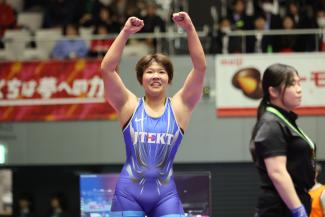
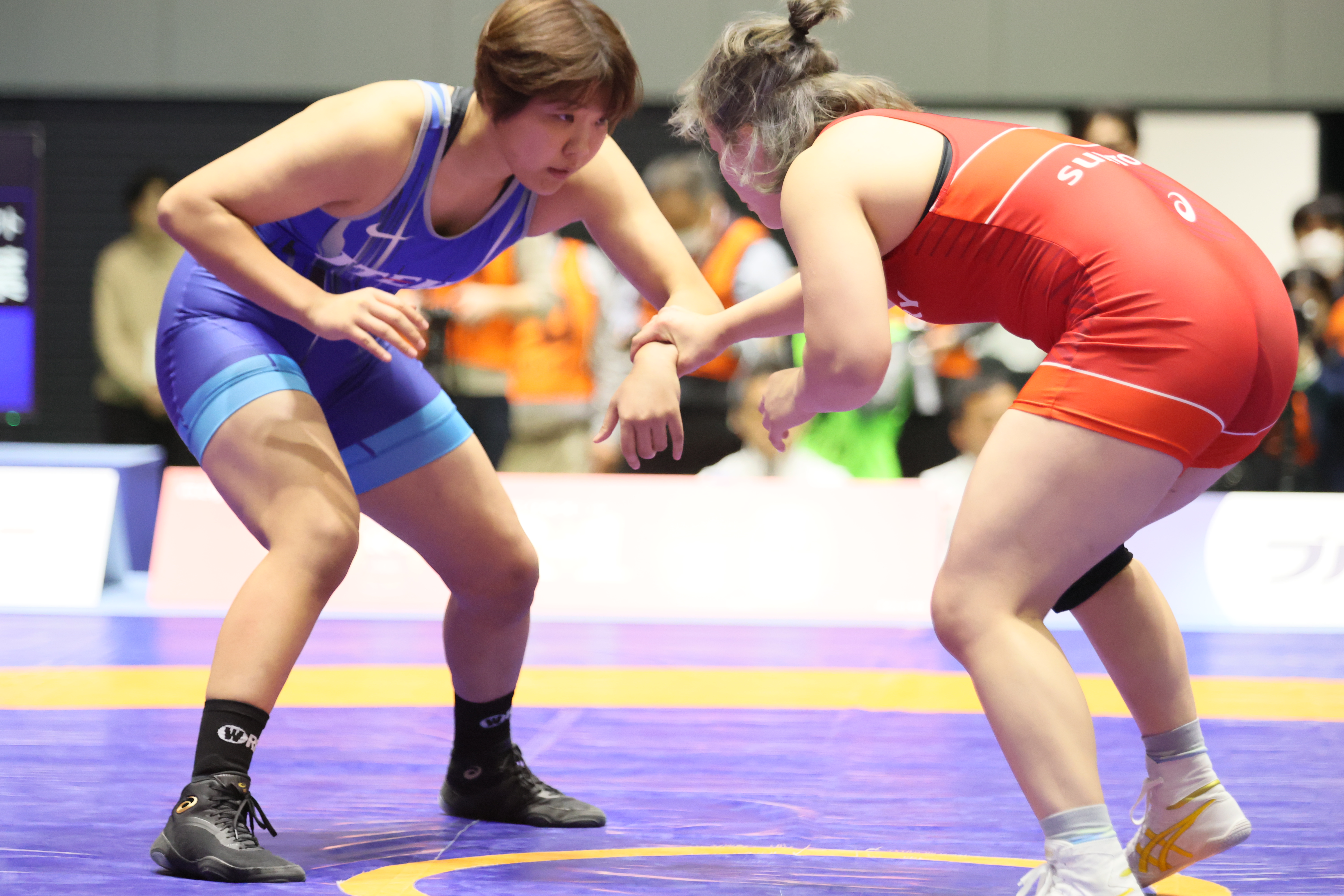 Yasuha MATSUYUKI, left, fends off Paris Olympic champion Yuka KAGAMI in the women's 76kg final. (Photo: Takeo Yabuki / wrestling-spirits.jp)
Yasuha MATSUYUKI, left, fends off Paris Olympic champion Yuka KAGAMI in the women's 76kg final. (Photo: Takeo Yabuki / wrestling-spirits.jp)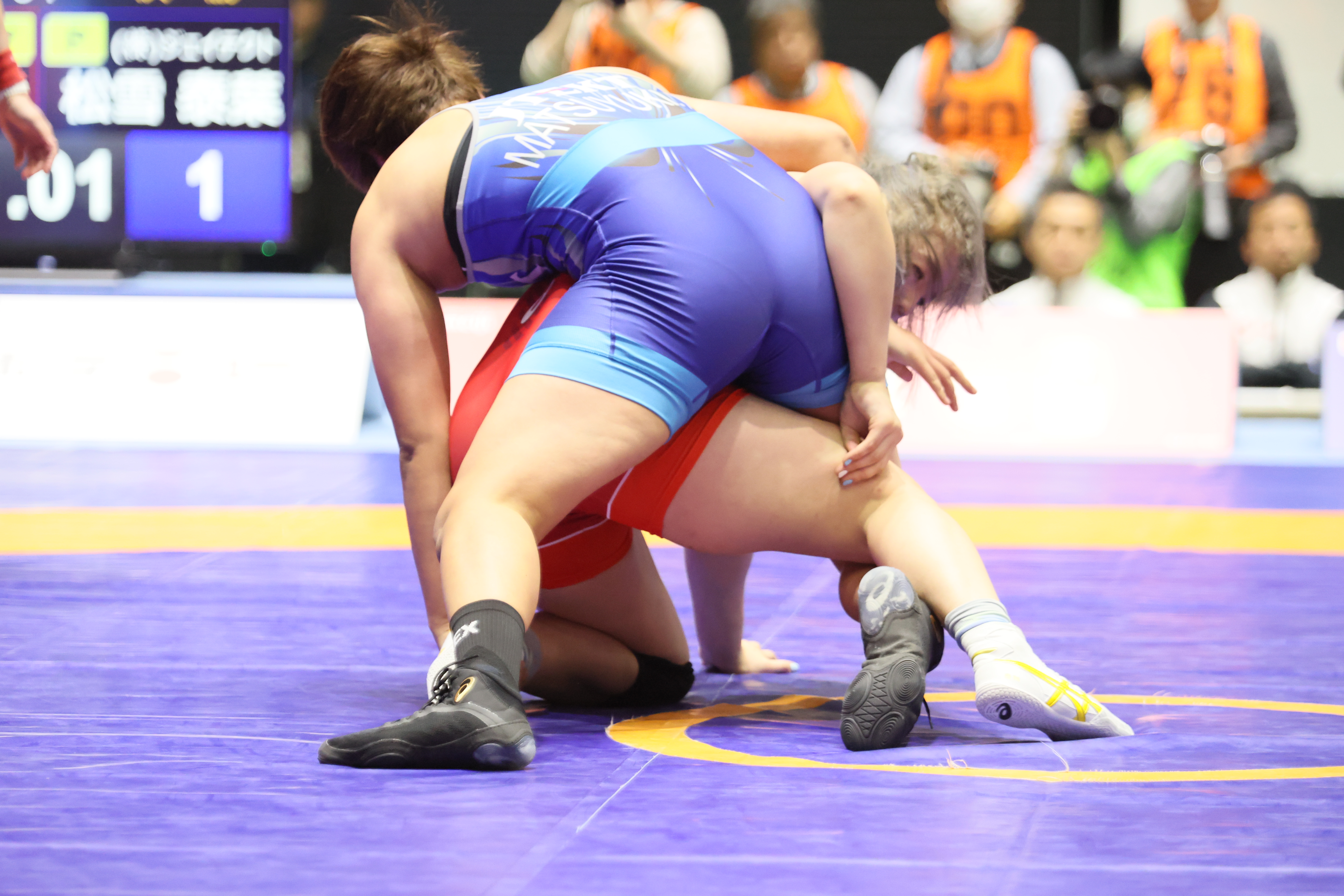 Yasuha MATSUYUKI, top, completes the winning takedown in the final seconds of the women's 76kg final. (Photo: Takeo Yabuki / wrestling-spirits.jp)
Yasuha MATSUYUKI, top, completes the winning takedown in the final seconds of the women's 76kg final. (Photo: Takeo Yabuki / wrestling-spirits.jp)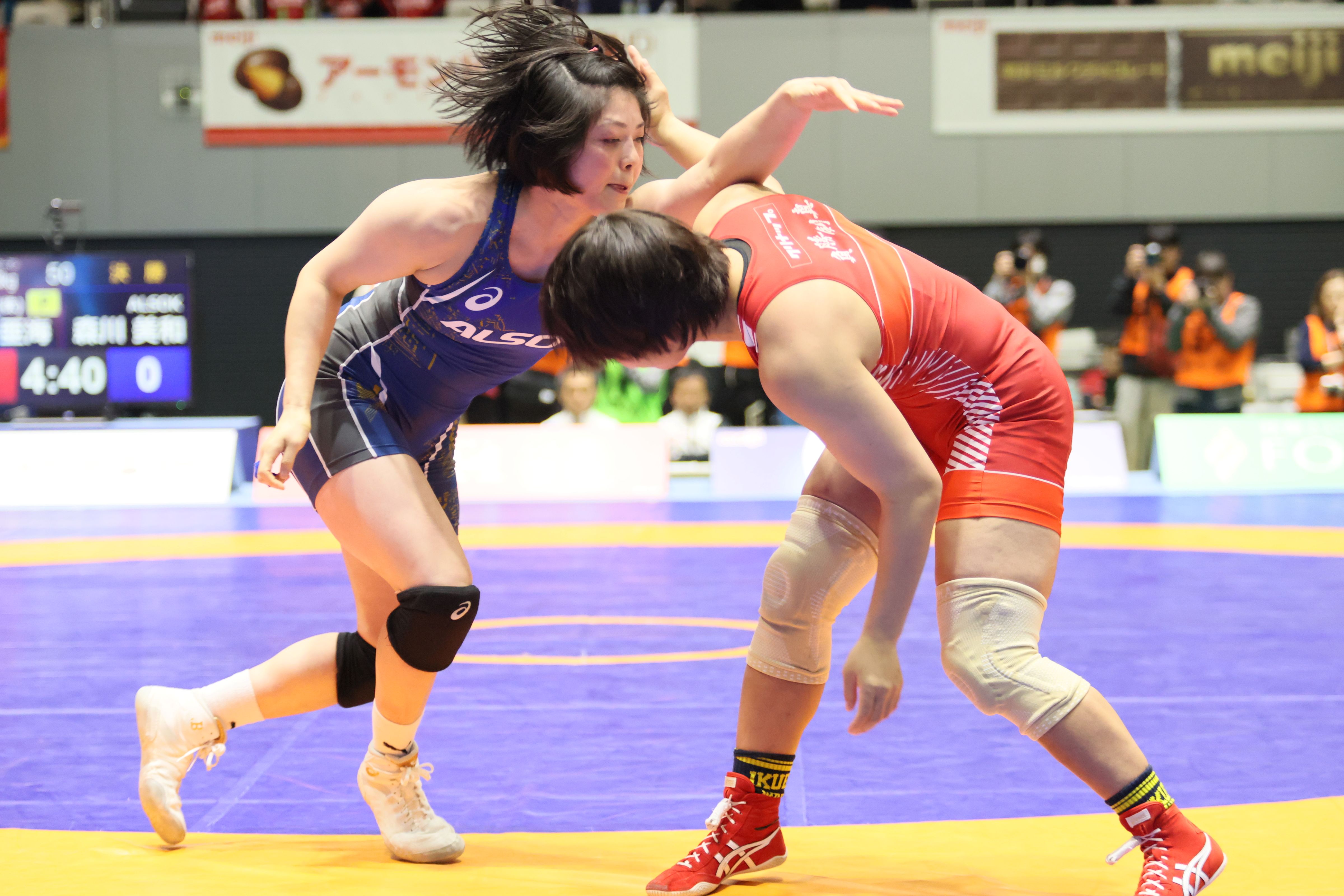 Reigning world champions Miwa MORIKAWA, left, and Ami ISHII battle in the women's 68kg final. (Photo: Takeo Yabuki / wrestling-spirits.jp)
Reigning world champions Miwa MORIKAWA, left, and Ami ISHII battle in the women's 68kg final. (Photo: Takeo Yabuki / wrestling-spirits.jp)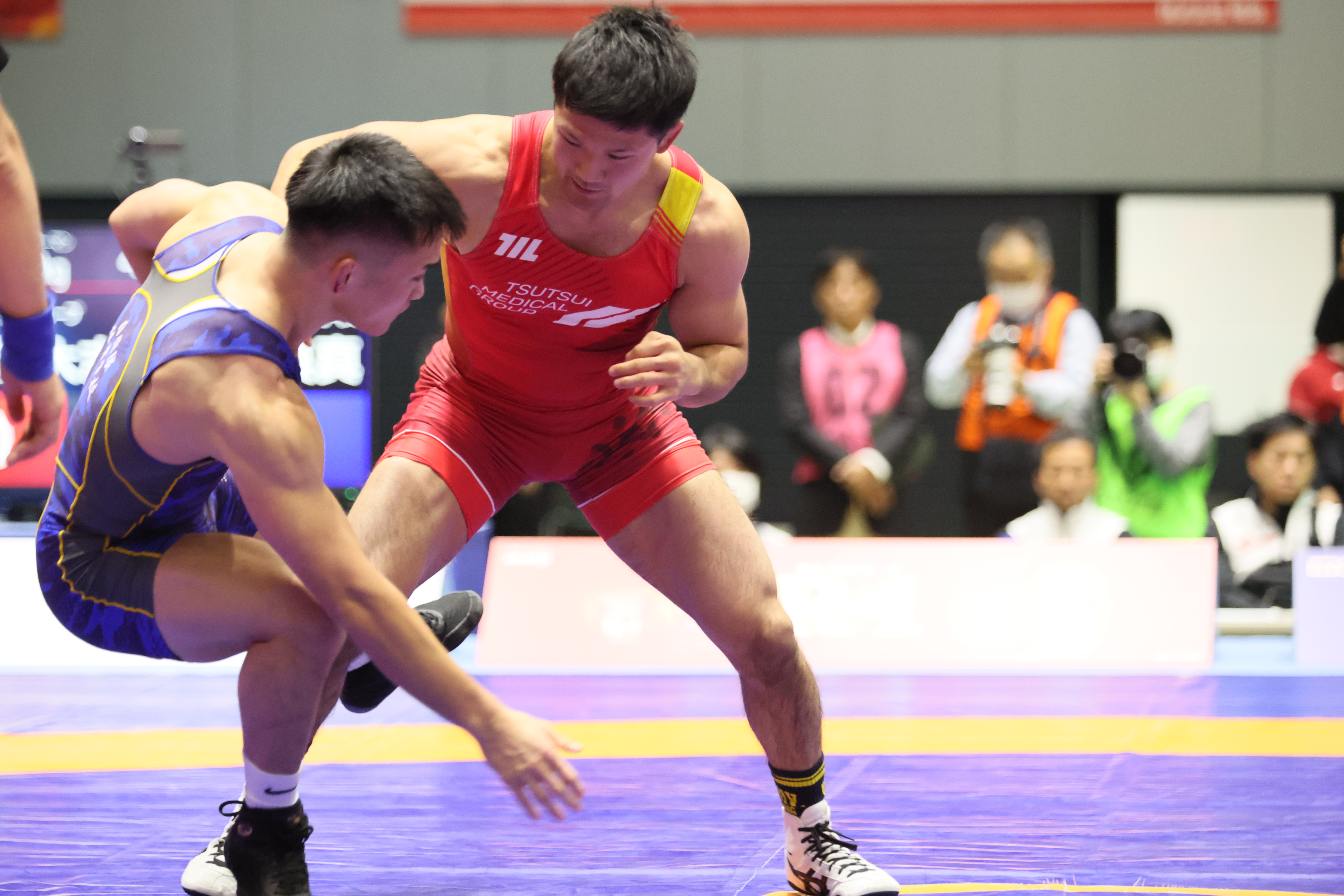 Taishi NARIKUNI, right, knocks Ryoma HOJO temporarily off balance during the Greco 72kg final. (Photo: Takeo Yabuki / wrestling-spirits.jp)
Taishi NARIKUNI, right, knocks Ryoma HOJO temporarily off balance during the Greco 72kg final. (Photo: Takeo Yabuki / wrestling-spirits.jp)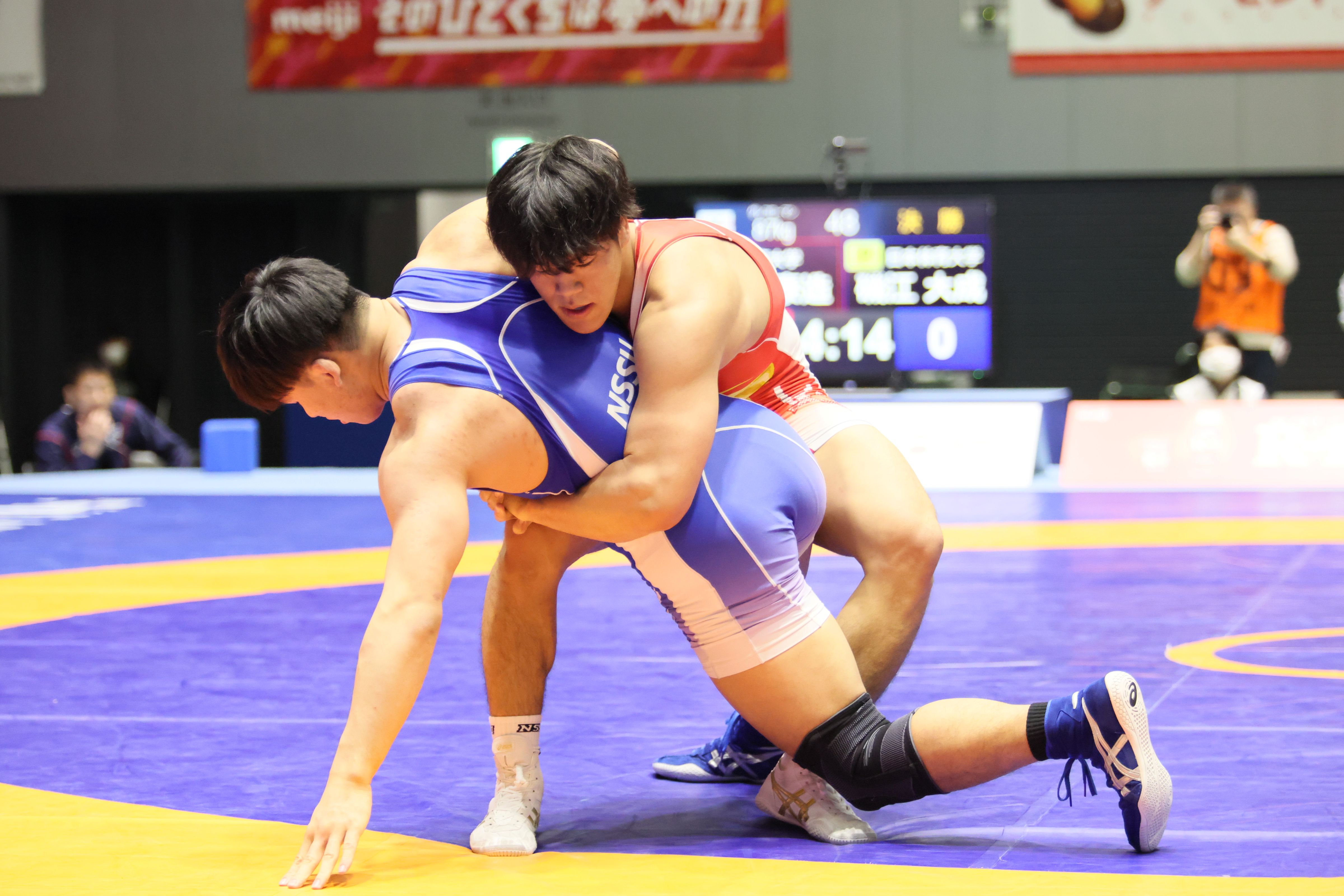 Taizo YOSHIDA, right, gets a grip on Daisei ISOE, but is unable to complete the lift. (Photo: Takeo Yabuki / wrestling-spirits.jp)
Taizo YOSHIDA, right, gets a grip on Daisei ISOE, but is unable to complete the lift. (Photo: Takeo Yabuki / wrestling-spirits.jp)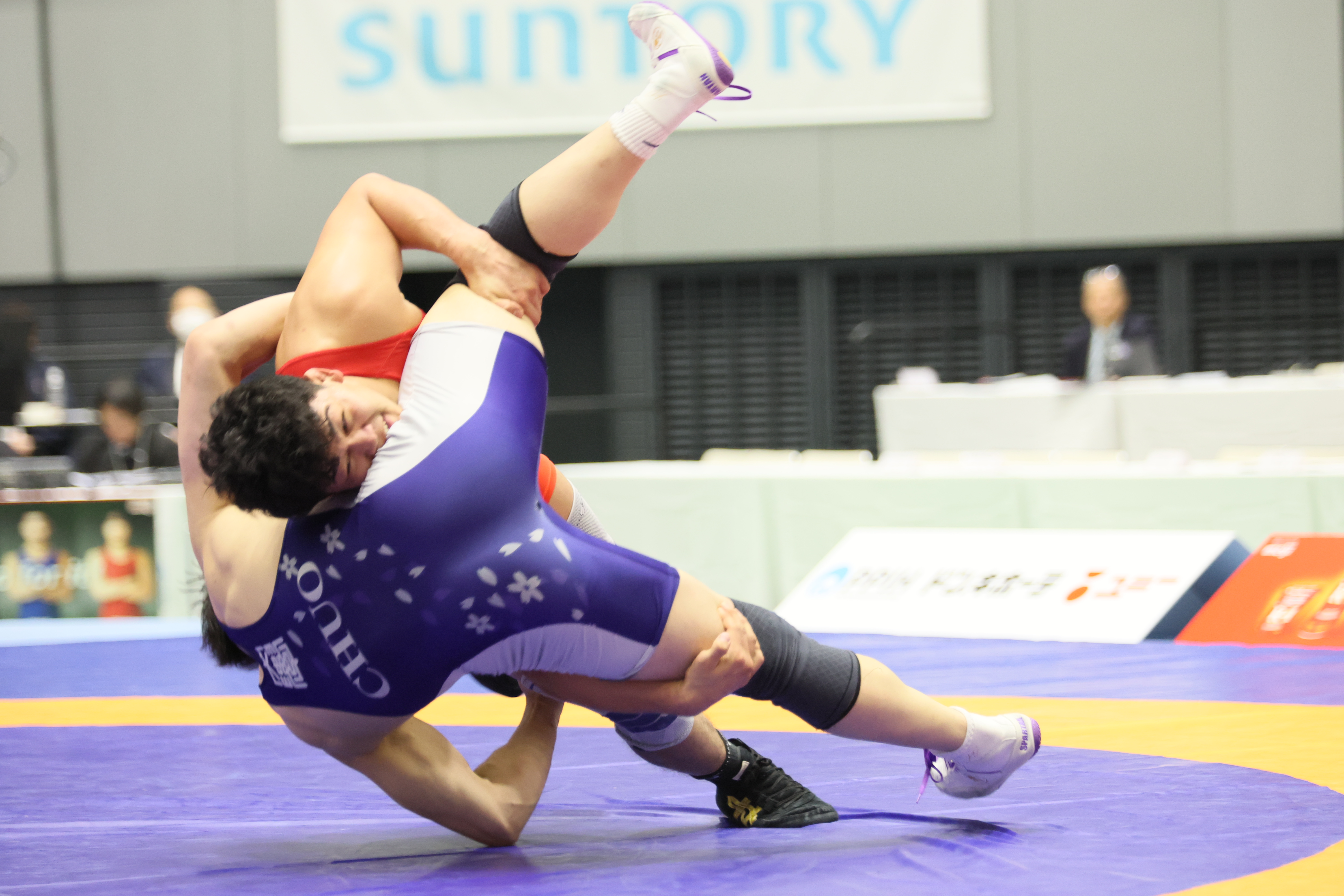 Arash YOSHIDA completes a takedown to the back against Toyoki HAMADA in their freestyle 97kg semifinal. (Photo: Takeo Yabuki / wrestling-spirits.jp)
Arash YOSHIDA completes a takedown to the back against Toyoki HAMADA in their freestyle 97kg semifinal. (Photo: Takeo Yabuki / wrestling-spirits.jp)
Share your thoughts.
Comments